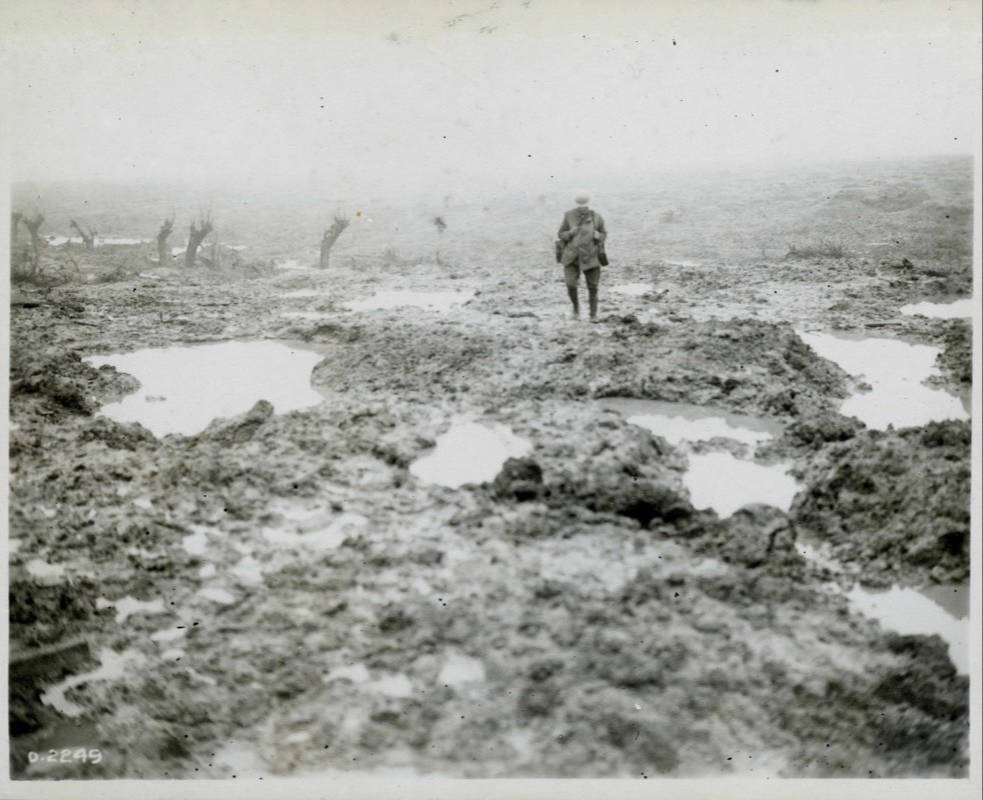This past summer, there was a great deal of national attention given to the centennial of the Battle of Vimy Ridge. Vimy was one of Canada’s greatest military victories of the First World War. To many, Vimy helped to forge a sense of nationhood for Canadians.
There was another epic victory for Canadians in the late fall of 1917 – the Battle of Passchendaele. While this battle once again demonstrated the enormous courage and fighting ability of the Canadian soldiers, it also epitomized the horrific conditions on the Western Front.
Passchendaele is a small village in Flanders (Belgium). Much of the land around it is low and marshy. Heavy rains and continual bombardment by the artillery of both the Allies and the Germans turned the future battlefield into a ‘porridge of mud.’
There were many reservations, even amongst the Allied High Command, about renewing major fighting in Flanders. However, ultimately it was decided that something had to be done to relieve the pressure on the main French armies to the south. Also, there was a need to eliminate the German submarine bases on the Belgium coast.
From the start, the Battle did not go well for the Allies. There were huge explosions of mines, but subsequent breakthroughs the German positions failed to materialize. Heavy artillery bombardments followed, but this made the muddy conditions much worse.
The Canadians were then sent into the front lines during October. Because of their tremendous success at Vimy Ridge in April 1917, they were considered some of the best assault troops on the Front.
The Canadians’ commander in chief, General Currie had grave misgivings about the mission. He thought the potential loss of lives far outweighed the strategic advantage of capturing Passchendaele and the swamps around it.
His prediction proved tragically accurate. As the Canadians pushed forward through the horrific ‘liquid mud’, while being continually hit with enemy shells and machine gun fire, the losses were indeed phenomenal. Before the battle was over, the Canadians incurred 15,654 casualties.
It is hard to image how bad things were during the battle. Men sat in water filled trenches for days on end. Wooden walkways, called ‘duckboards’ were laid across the mud so men could make their way across the churned up swamps. However, many men slipped off the duckboards only to drown in the quagmires as it was impossible to pull them out.
Over the course of the battle, some two dozen young men from across Central Alberta were killed. A great many more were severely wounded. Given the unbelievable conditions that they faced, a large number suffered wounds to their minds as well as to their bodies.
Nevertheless, the Central Albertans, and the Canadians in general, showed tremendous courage. Gordon McIllwraith, John Griffin, Frank Dorrance and Bill Barker won the Military Medal for bravery. W.S. Brett was in a unit where all the officers and half the men were killed. He was promoted to be an officer on the spot and was later awarded the Military Cross for his exceptional bravery.
George Pearkes, who had lived in Red Deer prior to the outbreak of the war, received the Victoria Cross, the highest award possible for bravery. Despite having been seriously wounded, he continued to press on with his unit towards their objectives. He then led a tremendous and successful defense against fierce enemy counterattacks.
At the end of the battle in early November, the Canadians finally captured the village of Passchendaele and moved the line forward some 9.5 km (six miles). In the spring when the Germans counterattacked, almost all the ground won at a huge cost was lost within three days.
While Canadians had ultimately achieved victory, Passchendaele was such a fiasco that the reputation of senior Allied Command was permanently blackened. Sir Winston Churchill later summed up the Battle as, “A forlorn expenditure of valour and life without equal in futility”.



